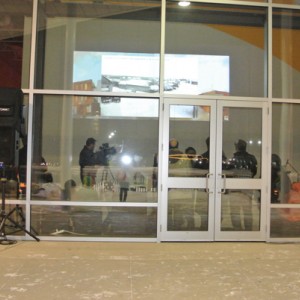Clybourne Park
By Bruce Norris
Directed by James MacDonald
Playing at the Shoctor Theatre at The Citadel
“It happens one house at a time,” observes one of the characters in Citadel Theatre’s production of Clybourne Park.
It is 1959 and a white working class neighbourhood is dealing with news that for the first time an African-American family has bought a house in the community. Desperate efforts are under way to prevent the sale going through and the family moving it.
“The family could be lovely – but that’s not the point – it’s the property values!” asserts another. And the action moves 40 years ahead to 2009, in the same house. An affluent young couple have bought the now-decayed building and are about to tear it down and build a big new house and some in the neighbourhood have gathered signatures on a petition, have a lawyer, and are seeking action from the city to prevent the house being built.
At one point a woman listening to heated angry arguments by those wanting to maintain the neighbourhood unchanged quietly muses, “Maybe we need to know what the other half eats… maybe we could all sit together at a big table…,” but her thoughts are ignored as the effort to stop the newcomers moves ahead.
Clybourne Park is a play that looks clearly at real social issues in North American cities. One character observes that there is a tension between “potential” and “what it used to be.” No city has escaped without similar debates.
Bruce Norris, the play’s author, has said, “It’s about… being the power elite, about being the people who have power….” Race is central to the play, but not in the simplistic ways one might expect. The inspiration for writing it was in the play A Raisin in the Sun which dealt with a case of the right to live in a community of choice that went to the US Supreme Court in the late 50s.
In a recognition of the fact many of the ideas explored in Clybourne Park can be found in current events in Edmonton today, Citadel Theatre presented a day-long forum, “Won’t You Be My Neighbour?”, the week before the play opened, with participation from Boardwalk, Edmonton Homeless Commission, Homeward Trust, Edmonton Federation of Community Leagues, and others. The interactions during the forum amongst the 100 people in attendance, as topics of non-market housing were discussed, demonstrated all the same lines of debate and difference of focus exist here as can be seen on stage in an imaginary Chicago community.
Some of the impact of the play rests in the believability of the characters. Each of them are people audience members know, each is sometimes profound in their insightful comments and other times infuriating in their prejudices and thoughtlessness.
Some of the impact of the play rests in the believability of the characters. Each of them are people audience members know, each is sometimes profound in their insightful comments and other times infuriating in their prejudices and thoughtlessness. No one is simply black or white and this drives home the point that dealing with the issues of who lives where in a community are ones that need to involve everyone. Dealing with them may be painful, but only when everyone considers their own views of where “value” lies that solutions may be found. Yet, even then, the play makes clear the outcomes may not be solutions for anyone, but only a continuation of the tensions between future possibility and preservation of the status quo. One character in the play accuses another, “You’ve never been marginalized like the majority of people,” and we see how the nature of community is our cities is always going to be linked to conflict and tension. The ambiguities of finding a way through these issues is made more graphic in Clybourne Park by using the same cast of actors in Act 1, set in 1959, and in Act 2, set in 2009. Personalities change but threads of commonality are clear: the details of the world are much different but the human issues of personal relationships and of policy and politics are familiar across the years.
While offering challenging views about important issues, the very human characters of Clybourne Park also entertain with clever humour and share personal pains and struggles, so the play is not an intellectual debate, but an evening of listening in to real people in very real situations.
In the audience a person will laugh at one moment and wince in embarrassment a moment later and nod an “Aha” of insight a moment later and then be back laughing again.
Clybourne Park runs at The Citadel until February 16, and is an evening that will provide good entertainment and much to think about after you leave the theatre.











